How Businesses Invest in Digital Marketing in 2018

How Businesses Invest in Digital Marketing in 2018
Businesses plan to invest more time and money in digital marketing this year. Businesses rely on a combination of resources in their digital marketing strategies and prioritize social media marketing and websites, according to a survey of 500 digital marketers.
More than three-fourths of people (76%) think marketing has changed more in the past 2 years than it did the entire 50 years before.
Today, it’s less important for businesses to invest in traditional marketing, such as pamphlets, billboards, flyers, and print advertisements. Instead, businesses should focus their investment on digital marketing.
Digital marketing helps businesses reach consumers in the ever-changing online world.
The Manifest surveyed 501 digital marketers to discover how they invest in digital marketing and how their investments will change in the next year.
Businesses can use this report to discover current and upcoming digital marketing trends and plan their digital marketing strategy accordingly.
Our Findings
- Nearly all businesses (99%) plan to increase their investment in at least one digital marketing channel in the next year.
- More than half of businesses plan to spend more time and money on social media marketing (64%) and a website (55%) in the next year.
- Businesses plan to spend less time and money on display/banner advertisements (19%) and paid search advertisements (18%) in the next year.
- Most businesses devote either 26-50% or 51-75% of their overall marketing budget to digital marketing.
- Nearly half of businesses (41%) invest more than $500,000 in digital marketing every year.
- Businesses use a variety of resources for help with their digital marketing efforts: in-house staff (69%), software (59%), a digital marketing agency (50%), and a freelancer/consultant (32%).
- Nearly one-third of businesses (32%) that don’t use a digital marketing agency and/or a freelancer/consultant plan to outsource their digital marketing efforts in the next year.
Ninety-Nine Percent of Businesses Will Increase Their Investment in Digital Marketing in the Next Year
Almost every business (99%) plans to increase its investment in at least one digital marketing channel in the next year.

Nearly all businesses will invest more in digital marketing because their customers are easier to reach online than through more traditional marketing channels.
“Everyone is online, all the time, and digital marketing is crucial in reaching this huge audience where they are,” said Aylin Cook, head of content marketing at digital marketing agency Single Grain. “In comparison to an ad in a newspaper or a billboard, which reaches a finite market, most of the world is online.”
Ninety-nine percent of businesses (99%) plan to increase their investment in at least one digital marketing channel because it is an essential tool in reaching consumers, who are likely online.
Businesses Will Invest More in Social Media and Websites
Most businesses plan to invest more in multiple digital marketing channels, but social media marketing and websites are their top priorities.
More than half of businesses will spend more time and money on social media marketing (64%) and websites (55%) in the next year.
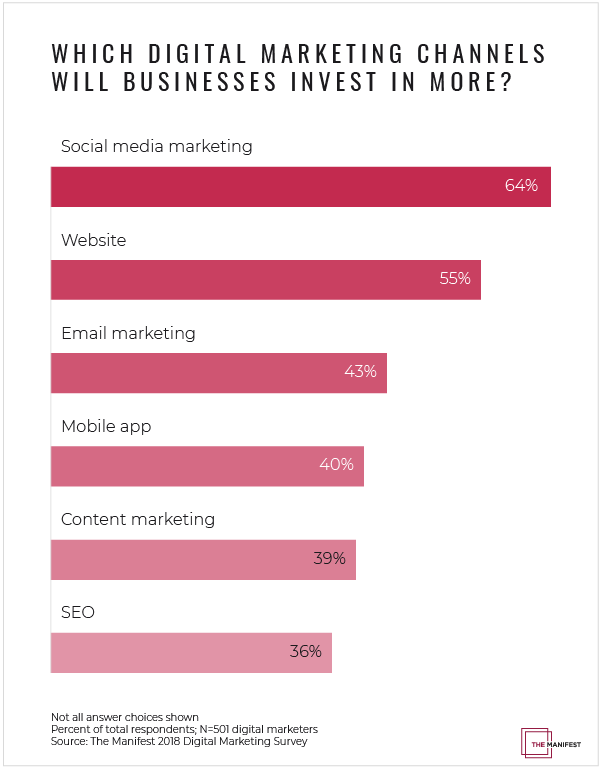
Businesses want to increase their investment in social media marketing and a website because it is easy to measure these channels’ results.
“They’re the strategies that business owners are most comfortable with,” said Flynn Zaiger, CEO of Online Optimism, a digital marketing agency in New Orleans. “If you’re trying to make a decision that will at least guarantee some sort of results, chucking money at social media or your web designer will make something happen.”
Social media and websites are easy investments for businesses and don’t take too much effort.
For example, MyCorporation, which helps customers file online documents to form a corporation or limited liability company, sees social media and a website as essential to its success.
MyCorporation uses social media channels such as Twitter to engage with other companies through humor and an approachable voice.

Social media helps drive traffic to MyCorporation’s website.
“Investing in social media marketing and a website is important for MyCorporation because it enables us to better communicate with our customers,” said owner Deborah Sweeney. “We feel that social media and our website help make our company ‘real’ to our customers and create a deeper connection to our team and our services.”
Social media marketing and a website help businesses like MyCorporation communicate and connect with consumers.
Businesses Will Invest Less in Display and Paid Search Advertisements
Nearly three-quarters of businesses (73%) plan to decrease their investment in at least one digital marketing channel in the next year.

Display/banner advertisements (19%) and paid search advertisements (18%) are the digital marketing channels businesses are most likely to cut.
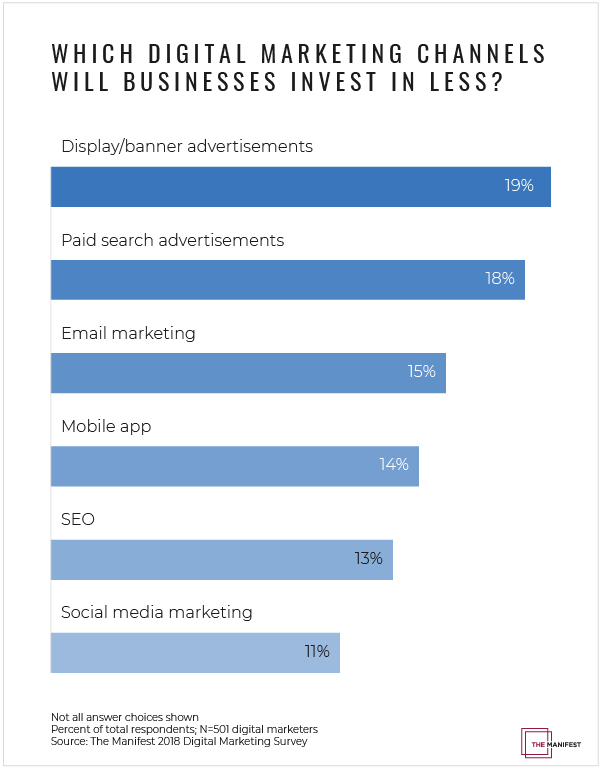
Businesses value these online advertising mediums less than other digital marketing channels because they don’t produce obvious results.
“A lot of businesses may not be paying as much attention to display or paid search advertisements because they may not know how to track the results,” said Jeremy Greenberg, founder of web design and digital marketing agency 97 Switch. “Businesses may think the prices are too high based on their margins to convert sales.”
Online advertisements are costly to implement, and it is difficult to track their results.
In addition, other digital marketing channels give businesses more control over where their message goes.
“[Display and paid search advertisements] have an abundance of importance, but you can’t control the whole experience, and that’s what makes it hard for some companies,” Greenberg said.
The lack of control businesses have with online advertising is likely the reason they are choosing to invest less in it.
Nevertheless, online advertising can be a successful digital marketing channel.
For example, KPOP Foods, a Korean food retailer, uses online advertising because it provides an easier way to reach consumers compared to traditional advertising.
KPOP Foods advertises on websites its customers spend time on, including Amazon.

More than 300 million people use Amazon, and KPOP Foods uses the website’s popularity to reach consumers more easily than on other mediums.
“Our current and potential customers spend more time online than any other media channel,” said Mike Kim, KPOP Foods co-founder and chief operating officer. “Companies that are not online and advertising [online] are at a disadvantage.”
Online advertising is harder to measure than other digital marketing channels, but it is still a successful strategy in reaching consumers who spend much of their time online.
How Businesses Invest in Digital Marketing Depends on Customer Needs
Digital marketing is an important part of a business’s overall marketing strategy, but you should look to your customers to determine how much of your budget you should devote to digital marketing.
Most businesses devote either 26-50% (38%) or 51-75% (34%) of their overall marketing budgets to digital marketing.
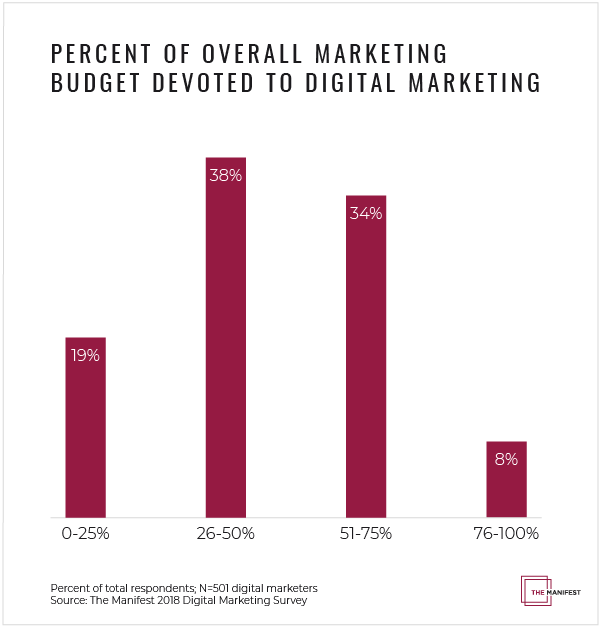
The budget that a business should devote to digital marketing varies by business and customer needs.
“It’s all over the map as far as industry goes,” said Jon Borg-Breen, co-founder and head of sales at B2B lead generation agency Symbiont Group. “To figure it out, you need to understand who you’re trying to sell to and define those personas.”
Creating personas of your ideal customer base will help you figure out how they consume content.
“Get a sense of exactly how people consume information and how they make purchasing decisions,” Borg-Breen said. “If digital is really big for these customers, then digital marketing should be a massive amount of your budget. If you’re in an old-school industry that doesn’t really do a lot of digital stuff, digital marketing may not make as much sense.”
To figure out the appropriate percentage of your budget to allocate to digital marketing, you must look to your customers.
For example, Jurassic Sands, a company that sells play sand for sandboxes, allocates nearly 100% of its marketing budget to digital marketing to educate its customers, who are mostly online.
“We focus so much on digital marketing over traditional marketing because it allows us to tell our story while educating customers,” said Joe Sloan, Jurassic Sands marketing and communications coordinator.
Jurassic Sands was founded in 1991, when traditional marketing was still a necessity. As the prevalence of technology increased, however, Jurassic Sands shifted its focus to a digital marketing strategy that includes a website, content marketing, email marketing, and social media.
Its content marketing strategy includes creating videos that educate customers about sand.

These videos – and digital marketing as a whole – help Jurassic Sands teach customers about the business more easily than with traditional forms of marketing.
“We used to rely so much on catalog companies,” Sloan said. “But now we can rely on word-of-mouth and customers organically coming across our company online. … People can visit our site and see our videos and understand our passion.”
Digital marketing helps Jurassic Sands grab the attention of its online-focused potential customers and measure the impact on conversions more effectively than traditional marketing.
A company should allocate some of its budget to digital marketing, but how much depends on its customers.
Nearly Half of Businesses Spend at Least $500,000 on Digital Marketing Annually
Business spending on digital marketing increases every year, according to experts.
More than four-fifths of businesses (81%) spend at least $50,000 on digital marketing each year, and 41% spend at least $500,000.

Zaiger predicts that the amount businesses spend on digital marketing will continue to increase.
“There’s been a significant uptick in digital marketing spend because it’s where consumers are,” Zaiger said. “If you’re trying to be in front of your customers, the screen is the place to be.”
Customers are online, and businesses should be, too, by investing in digital marketing.
Businesses Rely on Multiple Resources for Digital Marketing
Businesses use a combination of resources for digital marketing.
Most businesses use in-house staff (69%) and software (59%).
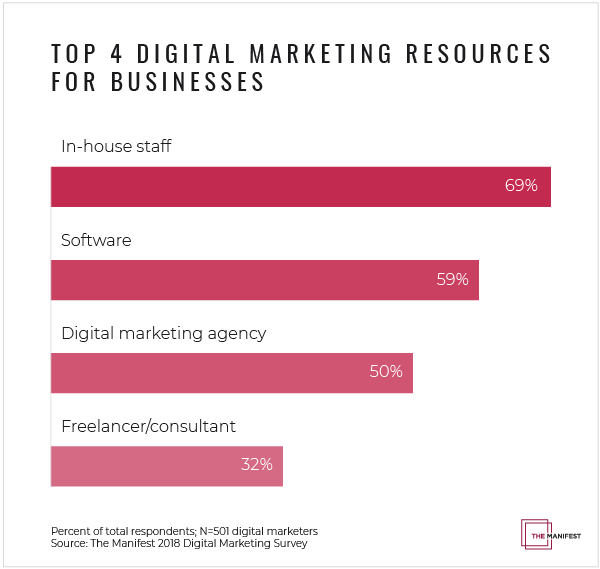
Many businesses also use outside resources such as a digital marketing agency (50%) or a freelancer/consultant (32%).
Using outside resources for help with your digital marketing efforts can yield valuable results.
“Trying to handle digital marketing by yourself is often a frustrating and difficult process,” Greenberg said. “There’s various tools and people that will help you make sure you’re actually getting results for every penny spent.”
Using outside resources gives you access to a team of experts who can help your strategy.
For example, MyCorporation uses both in-house staff and outsourcing in its digital marketing strategy.
“We outsource what can be leveraged from third parties’ expertise,” Sweeney said. “[When we have] the expertise in-house, we maintain it in-house.”
MyCorporation outsources the digital marketing channels its staff is not knowledgeable about, such as search engine marketing. The business uses in-house staff on digital marketing channels employees are experts in, such as content marketing.
Using in-house staff for channels you have expertise in but outsourcing the channels you are more unfamiliar with can create a winning digital marketing strategy.
One-Third of Businesses Plan to Outsource Digital Marketing Efforts
Many businesses that only use in-house staff for digital marketing plan to outsource their efforts in the future.
Nearly one-third of businesses (32%) say they are likely to outsource their digital marketing efforts in the next year.

A digital marketing agency or freelancer provides a different viewpoint of a business’s digital marketing efforts.
“[Companies] should be getting an outside perspective because sometimes extra minds can be a really big bolt to someone’s system,” Zaiger said.
Using a digital marketing expert who’s not a full-time employee with your company can lead to unique ideas and a stronger digital marketing strategy.
Some businesses, however, use only in-house staff for digital marketing because they prefer their own employees to the outside perspective Zaiger mentions.
Promocodes.com, a website that aggregates coupons for various retailers, for example, has no plans to outsource its digital marketing efforts, which include social media marketing, email marketing, content marketing, and a website.
Its in-house team creates the images and copy for its social media channels.

Promocodes.com’s team has the expertise to create a successful digital marketing campaign on its own.
“Everything is done in-house, as we have a strong team of leaders and knowledgeable experts who make sure our business runs smooth[ly] from day to day,” said Promocodes.com Director of Affiliate Marketing Marissa Jaffe. “We don’t plan to outsource. We prefer to keep our efforts in-house and make sure our voice is consistent and everyone’s goals are clearly aligned to best benefit the business.”
Businesses such as Promocodes.com are content with only using their in-house staff for digital marketing and do not consider outsourcing.
Other businesses believe they will benefit from outsourcing.
For example, KWIPPED, an online marketplace that offers B2B equipment rental, leasing, and financing, is planning to outsource all of its digital marketing instead of hiring in-house staff.
KWIPPED Chief Marketing Officer Robin Salter believes hiring an in-house staff for its digital marketing does not make sense for the company at this time.
“It would require a lot of effort to find and hire a team,” Salter said. “Plus, how much would I have to pay to hire enough qualified experts to fulfill all of these roles? Then I’d have to figure out how to integrate all of their expertise into a cohesive team working toward a common goal – something that an agency is built to do.”
Hiring an in-house team takes time and effort, which many companies can’t sacrifice.
Instead, KWIPPED plans to outsource its UX/UI design, SEO, content marketing, PPC, email marketing, video production, social media, and public relations.
It plans to transition its content marketing efforts, including its blog, to a contractor.
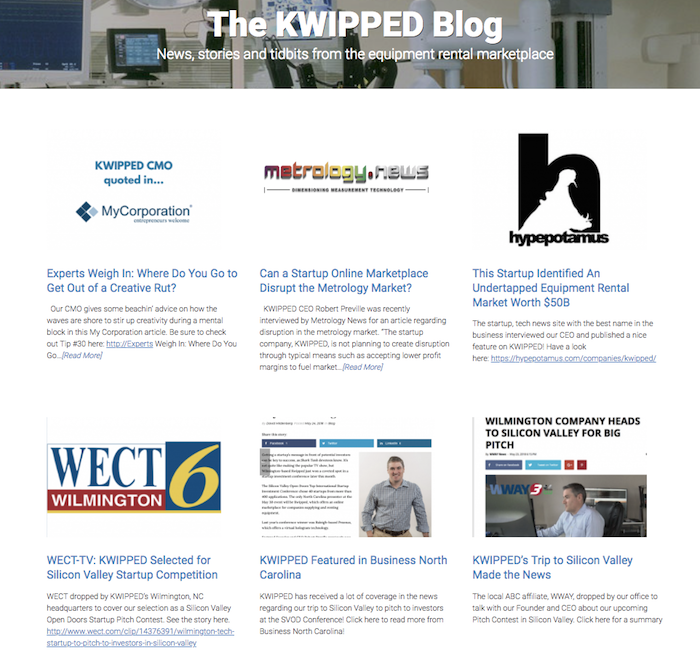
Outsourcing its digital marketing strategy will save KWIPPED time and money in the long-run.
“I believe a good agency can provide all of these services for a retainer that would cost substantially less,” Salter said. “If the results weren’t there, it would be easier to release the agency and find another one than to fire employees and build and train a new team.”
Outsourcing digital marketing can be more affordable and easier than hiring a full-time in-house team.
Digital Marketing Is an Important Investment
As consumers continue to rely on the internet to make a purchasing decision, businesses will likely continue to invest more in digital marketing every year.
Businesses invest in a combination of digital marketing channels, but they see the most value in social media marketing and websites, which are easy ways to reach consumers and measure results.
Using a combination of resources, such as in-house staff, software, and a digital marketing agency, helps businesses better their digital marketing strategies, which explains why more businesses plan to outsource some of their digital marketing in the next year.
Digital marketing is an essential tool, and businesses that invest in it can more easily reach consumers and influence their purchasing decisions.
About the Survey
The Manifest surveyed 501 digital marketers from businesses across the U.S. with more than 100 employees.
Most survey respondents are managers (36%), associates (15%), C-level executives (13%), senior managers (12%), and directors (12%).
Nearly three-fourths (73%) of respondents are from B2C companies; 27% are from B2B companies.
About 29% of respondents’ companies had a 2017 revenue of less than $50 million; 32% $50 million to $500 million; 39% more than $500 million.
